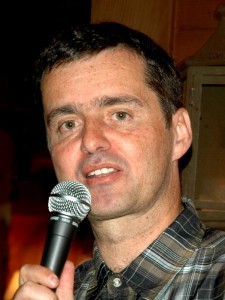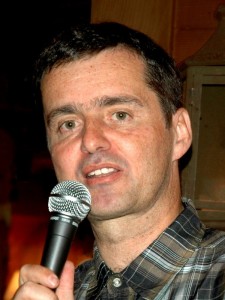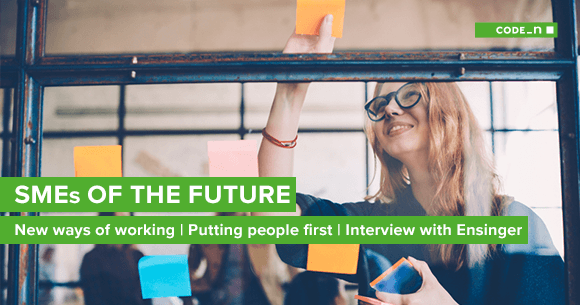NICOLAS BERG: “WE WANT TO TURN THE WORLD UPSIDE DOWN.”NICOLAS BERG: „WIR WOLLEN DIE WELT AUF DEN KOPF STELLEN.“
 We spoke to founder and venture capitalist Nicolas Berg about unpurchased Facebook shares, the enriching effect of gamification apps such as Quest.li, the DNA of successful startups, and why true venture capitalists also invest during times of crisis.
We spoke to founder and venture capitalist Nicolas Berg about unpurchased Facebook shares, the enriching effect of gamification apps such as Quest.li, the DNA of successful startups, and why true venture capitalists also invest during times of crisis.
Oliver Gassner: Hello Nicolas, would you please introduce yourself to our readers?
Nicolas Berg: I’m Swiss, a company founder since 1984, a business angel active in enterprises such as XING since 2000, and I’ve been with Redalpine VC Venture Partners since 2007.
OG: Is the present a good time to invest in startups?
NB: It’s always a good time to invest in startups – except perhaps during extreme hype phases, because insanity is contagious.
OG: So you’re saying we’re not in a hype phase (yet)?
NB: No, definitely not. If anything, the mood in soft-currency countries like the U.S. and the euro zone is somewhat reserved. But true startup founders and venture investors don’t care very much about that. We want to innovate and turn the world upside down.
OG: What are the signs of a hype setting in? Or do they creep in gradually, like the proverbial frog being brought to a boil?
NB: You can see it on the stock market when even the pros toss proven formulas such as price-earnings ratios overboard and start waffling about user multiples or Internet fantasy. It happened in the tech sector in 2000 and in Japan in the 80s.
OG: What’s the web or mobile app that changed your life or work the most?
NB: In the 90s it was e-mail, the AltaVista search engine, and financial platforms. In the past decade, Facebook, Skype, Google, YouTube, and a number of iPhone apps such as maps, phone books and messaging. At the moment my favorite is Quest.li, an app that offers web and location-based treasure hunts. And Connex.io, an app that intelligently synchronizes and merges all my address books, telephone directories and social networking contacts.
OG: Can such treasure hunts also serve marketing purposes, or are they pure entertainment?
NB: Either is possible. Anyone who plays Quest.li can also build their own quests. Quest creators can choose whether to run them locally or globally, and whether to make them free or require a stake. The company already has inquiries from major brands such as food chains and tour operators for quests to be built by the crowd, in which dedicated, informed brand consumers can win coupons.
OG: Can a web project that does not have a gaming, dating, or (ultimately) selling character ever be financially viable?
NB: A U.S. investor once said that social networks are always about finding more love or better business opportunities. That’s a bit of an oversimplification, though. Dating, “social” shopping and gamification are certainly important trends. I like the trend toward gaming best, because I feel that it’s becoming increasingly difficult to attract attention. Gaming is a state of mind in which not only children learn more effectively or are open to selling. I think people who are only into bargain-hunting don’t make sustainable new customers for brand partners, while smart gamers or Quest solvers are more committed, tightly networked, and probably more loyal.
OG:connex.io is “free for 60 days” (that always puts me off a bit). Others offer free accounts without time limitations but restricted functionality for their web apps. What’s better?
NB: For the first 60 days, connex.io lets you sync, merge and clean (dedupe) your data free of charge. If a clean contacts list isn’t worth $50 a year to you and you can do without the service, there’s no need to sign up as a premium customer. But many users with valuable networks of contacts, on LinkedIn or XING for example, will.
OG: The CODE_n Global Innovation Contest is a competition for entrepreneurs in the mobile sector. How important are competitions and prizes for business founders?
NB: They’re certainly a good thing. We’ve had good experiences with them in Switzerland. Awards such as venture kick, Heuberger, De Vigier, Venture, and Technopark let the best new or aspiring startups collect seed money to the tune of CHF 100,000. They also facilitate contacts to the investors on the jury. But once they’ve won two awards at the most, founders really should focus on building their businesses rather than entering competitions.
OG: How many startups does Redalpine support? And how many do you add every year?
NB: Redalpine looks at about 1,500 business ideas annually, or around five per day. We have invested in 16 European startups since 2007 and support them very actively. Previously, we invested privately in a similar number of startups from 2000 to 2006. Starting in 2012, Redalpine 2 is going to invest in another 20 to 25 startups.
OG: To get going, startups need a prototype and a good team – what do they need most urgently from the outside? PR? Connections? Money? Advice?
NB: Three things are important: an innovative, disruptive idea, a suitable business model, and a team of at least two highly talented entrepreneurs who are truly capable of realizing the vision on the market. We help as coaches and of course with our network, which includes co-investors, customers, partners, media, telcos and other potential team members.
OG: The CODE_n Global Innovation Contest offers 50 finalists exhibition space in a special CODE_n hall at CeBIT 2012. What’s your killer tip for startups on how to make the most of such an opportunity?
NB: I recommend that the winners put plenty of time, creativity, and diligence into how they are going to attract their target audience (customers, employees, journalists) to their booth before CeBIT. They should remember that trade show visitors are like moths: they’re drawn to light. They should also allow enough time and manpower to follow up the contacts after the show.
OG: In which startup (other than Facebook and Google) you would have liked to have invested and why?
NB: We were in fact offered Facebook shares back when the company was still valued at only $4 billion. But normally, we focus on ambitious start-ups based in German-speaking Europe. We haven’t really missed any deals in Switzerland that we regret, and in Germany it’s only been a few. We’re pleased with our portfolio: 100 insiders recently ranked the top 100 Swiss startups, and five of our portfolio companies were in the top 13 places. In the Life Sciences category, we even held the first through fourth places.
OG: Care to give us a name? It doesn’t have to be a deal that was offered to you.
NB: I would like to have invested in Apple in the 70s, because the company is now truly innovative and disruptive in three industries. I’ve loved Apple’s products since 1983.
OG: Thanks for taking the time to speak to us. 😉
NB: You’re welcome, talk to you again soon. Mit Gründer und Investor Capitalist Nicolas Berg sprachen wir über nicht gekaufte Facebook-Aktien, die bereichernde Wirkung von Gamification-Apps wie Quest.li, die Erfolgs-DNA für Start-ups und weshalb echte Venture Capitalists auch in Krisenzeiten investieren.
Mit Gründer und Investor Capitalist Nicolas Berg sprachen wir über nicht gekaufte Facebook-Aktien, die bereichernde Wirkung von Gamification-Apps wie Quest.li, die Erfolgs-DNA für Start-ups und weshalb echte Venture Capitalists auch in Krisenzeiten investieren.
Oliver Gassner: Hallo Nicolas, würdest du dich unseren Lesern bitte kurz vorstellen?
Nicolas Berg: Ich bin Schweizer, Gründer seit 1984, Business Angel seit 2000 mit Engagements wie zum Beispiel XING und nun VC seit 2007 mit Redalpine Venture Partners.
OG: Ist momentan eigentlich eine gute Zeit für Investitionen in Start-ups oder nicht?
NB: Für Investments in Start-ups ist die Zeit immer gut, außer vielleicht in extremen Hypephasen, denn Verrücktheit ist ansteckend.
OG: Das heißt: wir haben (noch) keine Hypephase?
NB: Nein, überhaupt nicht. Die Stimmung in Weichwährungsländern wie den USA und der Eurozone ist ja eher etwas bedrückt. Aber echte Start-up-Gründer und Venture-Investoren kümmert das wenig. Wir wollen ja die Welt innovativ auf den Kopf stellen.
OG: Woran würde man merken, dass der Hype einsetzt? Oder passiert das so graduell wie bei dem Frosch im heißen Kochtopf?
NB: An der Börse merkt man es daran, wenn selbst Profis plötzlich bewährte Formeln wie Kurs-Gewinn-Verhältnisse über Bord werfen und von User-Multiples oder Internet-Phantasie schwafeln. Das geschah 2000 im Technologiesektor und in den 80ern in Japan.
OG: Was war die App im Web oder mobil, die Deinen Alltag oder Deine Arbeit am meisten verändert hat?
NB: In den 90ern Email, die Suchmaschine Altavista und Finanzplattformen. In den Nullerjahren XING, Facebook , Skype, Google, Youtube und einige iPhone Apps wie Karten, Telefonbücher oder Messaging. Im Augenblick mag ich Quest.li am liebsten, eine App, die Web und Locaction basierende Schatzsuchen anbietet. Und Connex.io ist die App, die all meine Adressbücher, Telefonbücher und Social-Network-Kontakte intelligent synchronisiert und zusammenführt.
OG: Solche Schatzsuchen dienen dann auch Marketingzwecken? Oder ist das reines Entertainment?
NB: Beides ist möglich. Jeder, der Quest.li spielen kann, kann auch Quests selber bauen. Der Quest Creator entscheidet, ob ein Quest lokal oder global läuft, und ob er kostenlos ist oder einen Spieleinsatz erfordert. Die Firma hat aber bereits Anfragen von großen Marken wie zum Beispiel Foodketten oder Reiseanbietern, um von der Crowd Quests bauen zu lassen, über die engagierte Konsumenten, welche über eine Marke gut Bescheid wissen, Gutscheine gewinnen können.
OG: Kann ein Webprojekt, das weder Spielcharakter, Datingcharakter oder (schlussendlich) Verkaufscharakter hat, überhaupt finanziell funktionieren?
NB: Ein US-Investor hat mal gesagt, bei Sozialen Netzwerken geht es immer darum, zu mehr Liebe oder besseren Geschäften zu kommen. Das ist etwas überspitzt. Dating, “Social” Shopping und Gamification sind sicher wichtige Trends. Ich mag derzeit den Trend zum Spielen am liebsten, weil ich denke, dass es immer schwieriger wird, Aufmerksamkeit zu gewinnen. Spielen ist ein Bewusstseinszustand, in welchem nicht nur Kinder besser lernen oder sich etwas verkaufen lassen. Ich denke, reine Schnäppchenjäger sind für Markenpartner nicht sehr nachhaltige Neukunden, während smarte Spieler oder Quest-Löser eben engagiertere, besser vernetzte und wahrscheinlich treuere Neukunden sind.
OG: “Free for 60 days” steht bei connex.io (mich schreckt so etwas ab). Andere bieten bei Webapps immer funktional limitierte Gratisaccounts an. Was ist besser?
NB: Man kann sich ja seine Daten in den 60 Tagen gratis synchronisieren, zusammenführen und cleanen (deduplizieren) lassen. Wenn man dann auf den Dienst verzichten möchte und einem saubere Kontakte keine $50 im Jahr wert sind, muss man nicht zum Premium Kunden konvertieren. Aber viele User mit wertvollen Kontaktnetzen werden das machen, wie bei LinkedIn oder XING.
OG: Der CODE_n Global Innovation Contest ist ein Wettbewerb für Gründer im Bereich ‘mobile’. Wie wichtig sind Wettbewerbe und Preise für Gründer?
NB: Das ist bestimmt eine gute Sache. In der Schweiz haben wir damit gute Erfahrungen gemacht. Bei Preisen wie venture kick, Heuberger, De Vigier, Venture oder Technopark können sich die besten angehenden bzw. jungen Start-ups Seedmoney in der Größenordnung von CHF 100’000 abholen. Das schafft auch Kontakte zu Investoren, die in der Jury sitzen. Aber nach spätestens zwei gewonnenen Preisen sollte sich ein Gründer besser aufs Business als auf weitere Preise konzentrieren.
OG: Wie viele Start-ups betreut Redalpine? Wie viele kommen pro Jahr dazu?
NB: Redalpine sieht jährlich etwa 1500 Geschäftsideen, also rund 5 pro Tag. Wir haben seit 2007 in 16 europäische Start-ups investiert, die wir sehr aktiv begleiten. Davor haben wir von 2000 bis 2006 in eine ähnliche Anzahl Start-ups privat investiert. Redalpine 2 wird dann ab 2012 in 20 bis 25 weitere Start-ups investieren.
OG: Start-ups brauchen wohl zum Loslegen einen Prototypen und ein gutes Team – was ist das dringendste, was sie von außen brauchen? PR? Connections? Geld? Beratung?
NB: Drei Dinge sind wichtig: Eine innovative disruptive Idee, ein dazu passendes Geschäftsmodell und ein Team von mindestens zwei hoch talentierten Unternehmern, welche die Vision im Markt auch wirklich umsetzen können. Wir helfen als Coaches und natürlich mit unserem Netzwerk, etwa zu Ko-Investoren, zu Kunden, Partnern, Medien, Telcos oder weiteren potenziellen Teammitgliedern.
OG: Im CODE_n Global Innovation Contest bekommen die 50 Finalisten einen Ausstellungsplatz in einer speziellen CODE_n-Halle der CeBIT 2012. Was ist Dein Killer-Tipp für ein Start-up, wie sie diese Gelegenheit optimal nutzen können?
NB: Ich empfehle den Gewinnern, bereits vor der CeBIT viel Zeit, Kreativität und Fleiß darauf zu verwenden, wie sie die gewünschte Zielgruppe (Kunden, Mitarbeiter, Journalisten) an ihren Stand locken. Außerdem sind Menschen an Messen ähnlich wie Fliegen: Licht wirkt immer anziehend. Darüber hinaus sollte man auch genügend Zeit und Leute für die Nachbereitung der Messekontakte einplanen.
OG: In welches Start-up (also außer Facebook und Google) hättest du gern investiert gehabt und warum?
NB: Facebook-Aktien wurden uns tatsächlich angeboten, als die Bewertung noch nur 4 Milliarden USD betrug. Aber normalerweise fokussieren wir uns auf ambitionierte Start-ups, die ihren Hauptsitz im deutschsprachigen Europa planen. In der Schweiz haben wir eigentlich keinen Deal verpasst, dem wir nachweinen, in Deutschland nur wenige. Wir sind zufrieden mit unserem Portfolio: 100 Insider wählten neulich die Swiss Top100 Start-ups, und auf den ersten 13 Rängen platzierten sich 5 unserer Portfolio-Unternehmen. Im Sektor Life Science belegten wir gar die Ränge 1 bis 4.
OG: Es muss ja kein Deal sein, der euch angeboten wurde – ein Name?
NB: In Apple hätte ich gerne investiert in den 70er Jahren, weil die Firma echt innovativ und disruptiv ist in mittlerweile drei Branchen. Ich liebe die Apple-Produkte seit 1983.
OG: Danke für deine Zeit und das Gespräch 😉
NB: Gern geschehen, bis bald einmal.






Write a comment